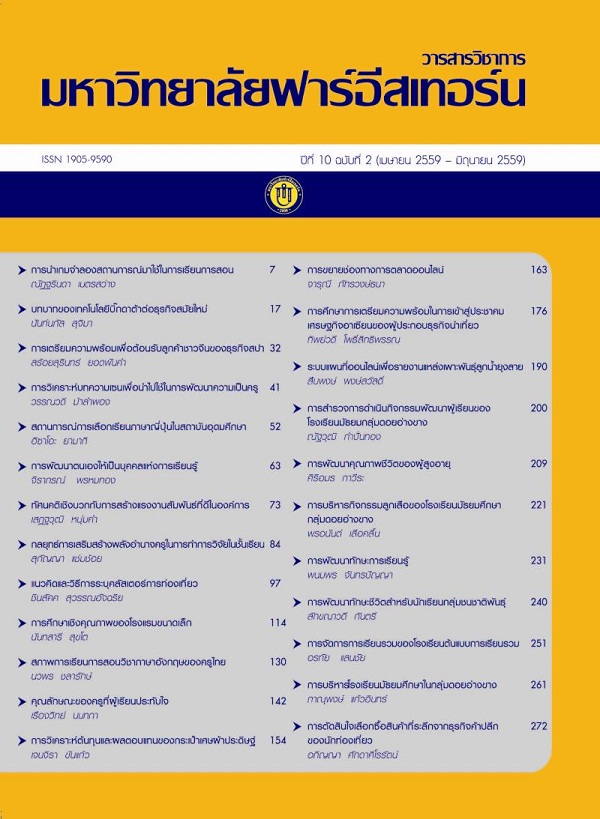การพัฒนาทักษะชีวิตสำหรับนักเรียนกลุ่มชนชาติพันธุ์ ตำบลเชียงดาว จังหวัดเชียงใหม่
Main Article Content
Abstract
ค่าเฉลี่ยต่ำสุด โดยมีรายละเอียดเพิ่มเติมจาการสัมภาษณ์ ดังนี้ (1) การจัดการด้านการตระหนักรู้และเห็นคุณค่าในตนเองและผู้อื่น พบว่า นักเรียนได้รับการสอนการตระหนักและเห็นคุณค่าในตัวเองและผู้อื่น จากการเรียนการสอนที่ครูสอดแทรกในชั่วโมงเรียน และการเข้าร่วมกิจกรรมต่าง ๆ
(2) การจัดการด้านการคิดวิเคราะห์ ตัดสินใจและแก้ปัญหาอย่างสร้างสรรค์ พบว่า นักเรียนเป็นชนเผ่า
มีความหลากหลายชาติพันธุ์ มีความแตกต่างทางวัฒนธรรม ไม่กล้าแสดงออก ไม่กล้าตัดสินใจ ไม่สามารถแก้ปัญหาได้ การจัดแหล่งเรียนรู้ภายในโรงเรียนยังมีไม่เพียงพอ สถานที่ในการจัดกิจกรรมมีน้อย สื่อ อุปกรณ์ สำหรับการจัดกิจกรรมมีไม่เพียงพอ รวมถึงสื่อและเทคโนโลยีในการสืบค้นไม่เพียงพอต่อจำนวนนักเรียน (3) การจัดการด้านการจัดการกับอารมณ์และความเครียด พบว่า ควรมีการปรับเปลี่ยนบรรยากาศในการเรียนการสอน โดยการพานักเรียนไปศึกษาจากแหล่งเรียนรู้ภายนอก และควรลดกิจกรรมหน้าเสาธงลง ครูควรให้คำปรึกษา แนะแนว และเป็นกันเองกับนักเรียน (4) การจัดการด้านการสร้างสัมพันธภาพที่ดีกับผู้อื่น พบว่า การเข้าร่วมกิจกรรมของโรงเรียน และปฏิบัติตามกฎระเบียบของโรงเรียน และการทำงานร่วมกับผู้อื่น ทำให้เกิดการสร้างสัมพันธภาพที่ดีต่อกัน
The research titled “Life Skills Management of Ethnic Group Students in Chiang Dao Educational Quality Development Center, Chiang Dao District, Chiang Mai Province” aimed to investigate the life skills management of ethnic group students in Chiang Dao Educational Quality Development Center, Chiang Dao District, Chiang Mai Province. The target group used in this study included supervisors, school administrators, head of academic affairs department, heads of 8 learning areas, 62 advisors of lower secondary education and 10 ethnic group students. There were totally 72 people. The tools used in this research comprised (1) 5-rating scale, reliability have .888 and questionnaires analyzed by frequency, percentage, mean and standard deviation and (2) unstructured interviews analyzed by content analysis. The findings were as follows: according to the life skills management of ethnic group students in Chiang Dao Education Quality Development Center, Chiang Dao District, Chiang Mai Province, the respondents agreed that the overall performance was at high level. When considering each aspect, it was found that the planning management is in the highest level and the controlling management is in the lowest level. When considering each aspect of life skills, it was found that the recognition and self-esteem/other respectfulness; the planning management is in the highest level. For the aspect of analysis decision and creative solving of the problem; the controlling management is in the lowest level. The additional details from the interviews were as follows: (1) The awareness and self-esteem and others indicated that the students were taught to recognize and appreciate themselves and others from learning and teaching intervened by the teachers in the classroom hours and participation in various activities. (2) The critical thinking and creative problem solving revealed that the students were ethnic with diverse races, different culture. They were unassertive, indecisive and could not solve their problems. The learning resources within the school were not enough. There were only a few places used for arranging activities. Media and equipment used for arranging activities were not adequate. In addition, searching media and technology were insufficient for the number of students. (3) The dealing with emotions and stress showed that the learning and teaching atmosphere should be changed by taking the students to study from external sources. The activities in front of the flag should be minimized. The teachers should give advices and guide the students and were friendly to them. (4) The good relationship creation with others revealed that to participate in the school activities, to follow the school rules and to work with others affected the good relationship creation with each other.
Article Details
1. Any views and comments in the Journal of Social Innovation and Lifelong Learning are the authors’ views. The editorial staff have not to agree with those views and it is not considered as the editorial’s responsibility.
2. The responsibility of content and draft check of each article belongs to each author. In case, there is any lawsuit about copyright infringement. It is considered as the authors’ sole responsibility.
3. The article copyright belonging to the authors and The Far Eastern University are copyrighted legally. Republication must be received direct permission from the authors and The Far Eastern University in written form.

